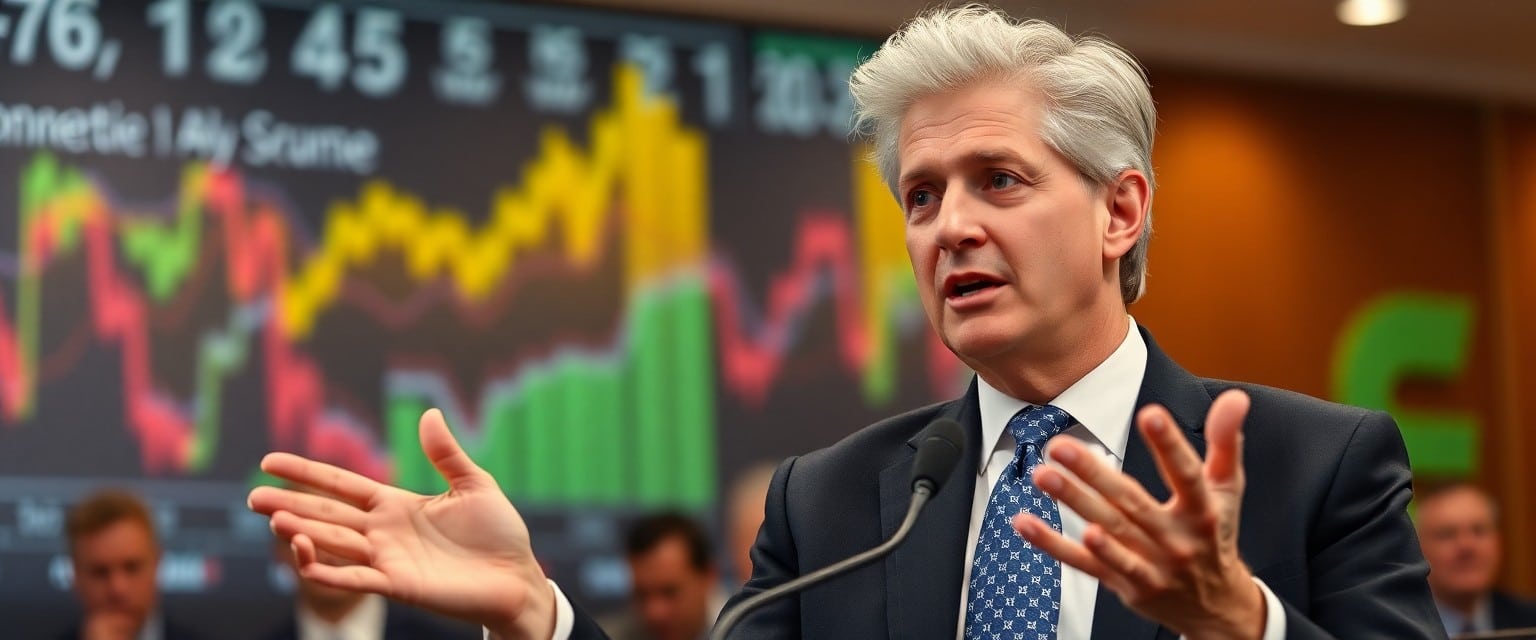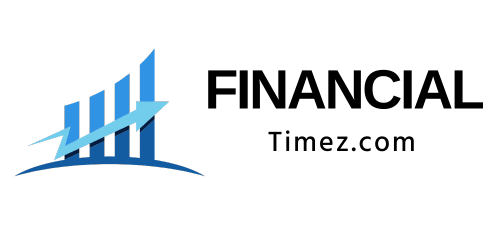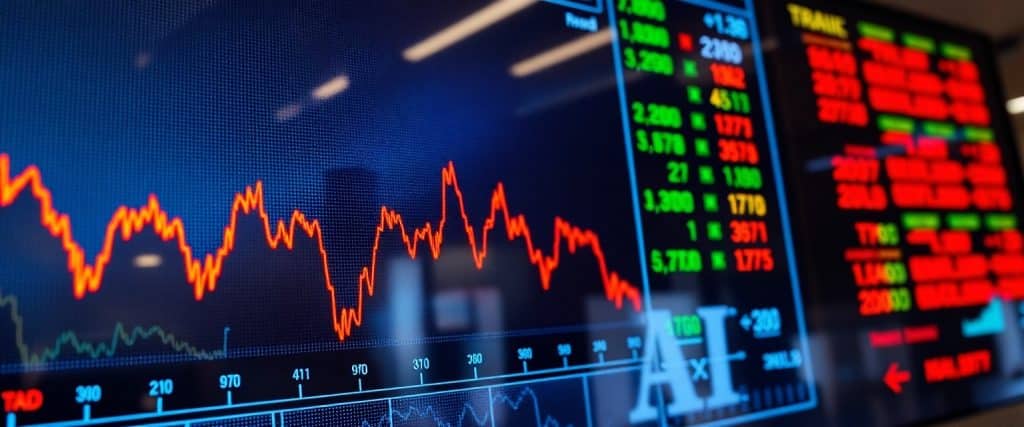Many business leaders, including billionaire investor Bill Ackman, are openly criticizing President Trump’s aggressive tariff plans that threaten to disrupt global trade and your economic stability. Ackman warns that these massive and disproportionate tariffs could trigger an economic nuclear war, halting business investment and reducing consumer spending. You should be aware that other influential figures like Jamie Dimon and Elon Musk share these concerns, highlighting risks like rising inflation and slowed growth. Understanding this collective opposition can help you grasp the potential impact of tariffs on your investments and daily life.
The Tariff Controversy: Ackman’s Alarm
Bill Ackman has sounded a stark warning against Trump’s sweeping tariff plan, labeling it an economic nuclear war that threatens to halt business investment and close consumer wallets nationwide. With tariffs jumping to 10% on all imports and steep hikes targeting key partners like China (34%) and the EU (20%), Ackman foresees widespread damage to America’s global reputation—a blow that could take years or even decades to repair. His call for a 90-day negotiation pause highlights the urgency of rethinking these disproportionate moves before irreversible harm sets in.
The Economic Nuclear War Analogy
Ackman’s framing of the tariffs as an “economic nuclear war” captures the severity of potential fallout, where trust and cooperation between the US and its trade partners could quickly erode. This metaphor underscores how the tariffs risk triggering a cycle of retaliation, disrupting supply chains, and unleashing unpredictable market turmoil—all of which threaten to shatter investor confidence and stall economic momentum on a global scale.
The Ripple Effects on Investment and Consumer Behavior
The uncertainty bred by these tariffs forces companies to pause or cancel investments, wary of sinking capital into projects at risk of reversal due to unpredictable trade policies. Consumers, meanwhile, brace for higher prices, tightening spending habits amidst inflation fears. This dual slowdown in investment and consumption risks triggering a sustained economic downturn, creating a self-reinforcing cycle that can drag out recovery efforts and depress growth.
Investors like Simon MacAdam at Capital Economics stress that companies, especially mid-sized and large-cap, are caught in a bind: launching new plants or expansions now could prove wasteful if tariffs are later rolled back. This dithering extends beyond capital projects to hiring and innovation, as executives prioritize caution over opportunity. Meanwhile, consumers face looming price hikes across everyday goods, which historically depresses demand and forces businesses to retrench further. Taken together, these shifts illustrate a widespread economic hesitation that could slow progress well beyond the immediate tariff impact.
High-Profile Opposition: A Collective Rejection
You’re witnessing an unprecedented alignment of powerful voices across the business world rejecting Trump’s tariff approach. From Ackman’s “economic nuclear war” warning to Jamie Dimon’s caution about recession risks, the message is clear: these levies threaten growth, investment, and America’s global reputation. This collective disapproval from leading billionaires and CEOs reveals deep fractures in confidence, making it harder for you to ignore the broader economic implications unfolding as trade tensions escalate.
Voices of Dissent from the Business Elite
Billionaires like Bill Ackman, Stanley Druckenmiller, and Ken Fisher openly criticize tariffs exceeding 10%, calling the policy “stupid” and disproportionate. Jamie Dimon underscores risks of higher inflation and slower growth, while Musk advocates for a “zero-tariff” free-trade zone. Their blunt assessments reflect not just economic concerns but a growing frustration with trade tactics seen as reckless and damaging to long-term business stability and investment planning.
The Growing Chorus of Concern Over Tariff Impact
Economic experts and investors alike echo the dangers of uncertainty triggered by these tariff hikes. Simon MacAdam warns that, without clarity, businesses could pause major investments, risking millions in stalled growth. Ackman’s call for a 90-day negotiation “time out” stresses how massive tariffs may backfire, potentially causing damage that could take decades to repair. The mounting anxiety across global markets signals a widespread fear that these measures could hamper consumer spending and trigger broader economic downturns.

Unpacking the Numbers: Trade Imbalances and Proposed Tariffs
The heart of Trump’s tariff strategy lies in targeting countries with the largest trade imbalances against the US. By imposing higher “reciprocal” tariffs, the administration aims to force these partners to reduce their tariffs on American goods. Yet, the proposed levies risk disturbing global supply chains and escalating costs for consumers and businesses alike. The challenge is that while the US trade deficit with some nations reaches hundreds of billions annually, the tariffs—starting at 10% and soaring higher—may trigger widespread economic reverberations, far outweighing any immediate trade corrections.
The Scale of Proposed Tariffs on Key Trading Partners
Already in effect, the baseline 10% tariff covers all goods imported into the US, but the most severe measures hit major partners like China with duties as high as 34%, and the European Union facing 20%. These steep increases represent a substantial departure from previous trade policies, threatening to disrupt markets worldwide and unsettle businesses, which now must grapple with sharply elevated costs and uncertain trade barriers that could linger indefinitely.
Predictions for Inflation and Recession Risks
The tariffs are expected to push consumer prices higher, with JPMorgan CEO Jamie Dimon warning that inflation could accelerate, increasing the likelihood of a recession. The concern is that tariffs will squeeze corporate margins and consumer spending power, slowing economic growth and potentially tipping fragile sectors into downturns as uncertainty rattles confidence across industries.
Inflationary pressure arises because tariffs effectively act like taxes on imported goods, forcing companies to either absorb higher costs or pass them onto you, the consumer. This price hike can reduce your purchasing power, leading to decreased demand and slowing overall economic momentum. Combined with the uncertainty about how long these tariffs will last, businesses hesitate to invest in new projects or expansions, fearing wasted expenditures if policies reverse. This environment heightens recession risks as slower growth and rising costs tighten financial conditions nationwide.
CEO Perspectives: The Business Climate Under Threat
Leading CEOs express deep concern over the new tariff regime, highlighting its potential to derail business confidence and economic stability. With tariffs hitting up to 34% on key partners like China, executives fear a sharp rise in costs that will stifle growth and innovation. Jamie Dimon warned of inflationary pressures and recession risks, while Bill Ackman described the scenario as an “economic nuclear winter” that stalls investment and damages America’s global reputation. The consensus is clear: your ability to plan and commit long-term capital is under direct threat from policy-induced market volatility.
Executive Sentiment on Long-Term Investments
CEOs and boards are retreating from making major investments amid tariff uncertainty. The baseline 10% tax and looming higher levies have created hesitation among mid-sized and large companies, wary of committing hundreds of millions to new plants that might become obsolete if tariffs are revoked or adjusted. This pause slows economic momentum, as Bill Ackman pointed to a near halt in business investment and consumer spending alike, signaling a broader chill in capital projects that underpin sustained growth.
The Role of Uncertainty in Economic Decision-Making
Unpredictability around tariffs is paralyzing economic decisions, as firms struggle to forecast future costs and market access. Simon MacAdam from Capital Economics emphasized how this uncertainty forces businesses to delay or cancel expansions, awaiting clarity on whether levies will persist or be rolled back. When trade policy shifts rapidly and unevenly, it muddies the investment landscape, eroding confidence and discouraging the forward planning crucial for robust economic activity.
Delays in investment due to policy uncertainty can cascade into broader economic stagnation. Companies face significant risk assessing long-term commitments when tariffs could fluctuate wildly within months, leading to inefficient capital allocation. This environment not only hampers expansion but also reduces the incentives for innovation and hiring, as organizations adopt a defensive stance. The resulting contraction in business spending compounds market anxiety, feeding a cycle where uncertainty diminishes growth prospects and erodes the very confidence needed for recovery.
Calls for Diplomacy: Seeking Alternatives to Tariffs
Pressure is mounting among influential business figures to pivot from punitive tariff measures toward more diplomatic approaches that safeguard economic stability. You’re seeing growing support for negotiated solutions that repair unfair trade imbalances without triggering market chaos. Open dialogue between the US and its trading partners could prevent the damage now forecasted, allowing investments and consumer spending to continue rather than falter. Instead of escalating tit-for-tat duties, these leaders advocate for strategic talks that preserve America’s global standing and economic growth.
A Proposed 90-Day Negotiation Period
Bill Ackman has called for a 90-day “time out” to halt the escalating tariffs and open formal negotiations addressing asymmetrical trade practices. This window would give negotiators the chance to resolve disputes without the threat of further economic fallout. Such a moratorium could encourage investor confidence by reducing uncertainty, preventing business investment from freezing, and potentially avoiding a protracted trade war that could cripple growth for years.
The Vision for a Zero-Tariff Landscape
Elon Musk and other industry leaders envision a future where trade flows freely without tariff barriers, creating a near “free-trade zone” between North America and Europe. This zero-tariff ideal aims to eliminate costly tariffs that inflate prices and deter cross-border investments, facilitating smoother supply chains and innovation exchange.

To wrap up
Summing up, you should be aware that Bill Ackman, once a supporter, is now opposing Trump due to the damaging impact of tariffs on the economy. He warns that these measures could halt business investment and harm America’s global reputation. And Ackman is not alone—other influential business leaders also express concern that the tariffs threaten growth and stability. As these viewpoints highlight growing unease in the business community, you can expect continued economic uncertainty and market volatility if current trade policies persist.
Frequently Asked Questions
What prompted Bill Ackman to call for a pause on Trump’s tariffs?
Bill Ackman, a prominent hedge fund manager and former Trump supporter, warned that the sweeping tariffs could lead to an economic downturn. He urged a 90-day pause to allow for negotiations and prevent further market instability.
How have the tariffs affected the stock market?
The implementation of the tariffs led to significant market volatility, with the S&P 500 losing nearly $5 trillion in value over two days. Investors expressed concerns about potential recession and inflation risks.
What are the potential economic consequences of the tariffs?
Experts warn that the tariffs could disrupt global supply chains, increase consumer prices, and erode investor confidence, potentially leading to a recession if not addressed promptly.
Who else has criticized the tariff policy?
Other prominent figures, including Elon Musk, Stanley Druckenmiller, and Jamie Dimon, have expressed concerns about the tariffs, citing potential negative impacts on the economy and financial markets.
Has President Trump responded to the criticism?
President Trump has defended the tariffs as necessary for correcting trade imbalances. However, following market backlash, he announced a 90-day pause on certain tariffs to allow for negotiations.

